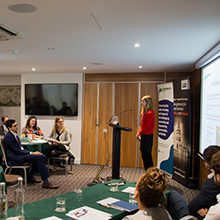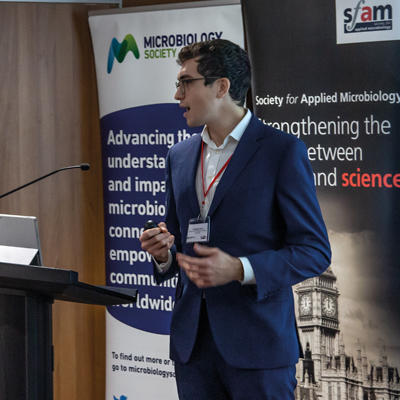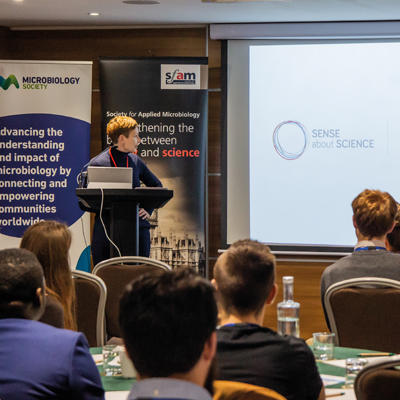Why should scientists care about policy?
Issue: Why Microbiology Matters
05 May 2020 article

Experiences from the Microbiology Society Science Policy Workshop for Microbiologists.
I’m a PhD student from the University of Cambridge, where I’m using classical laboratory-based research techniques to study immune evasion by human cytomegalovirus (HCMV). My aim is to gain insight into the interactions between virus and host in order to develop therapeutics that would prevent the virus from overcoming cellular defences. Despite the vital importance of basic research, I am sometimes disheartened that the direct translation of my work into benefits for society is not always obvious. This led me to consider science policy as a means to increase the impact of my research, and to attend the Microbiology Society’s Science Policy Workshop for Microbiologists. The workshop was held in partnership with the Society for Applied Microbiology (SfAM) on 25 November 2019 in London.
Outline of the day

Science in Parliament and Government
The morning started with a presentation by Dr Chris Brown (House of Commons Science and Technology Committee) who gave an insightful introduction into science policy. Science policy involves the integration of scientific expertise with an understanding of government and policy-making to ensure that legislation and policy have a sound evidence base. Dr Brown highlighted the two areas in which research scientists can have an impact: ‘policy for science’ and ‘science for policy’. This was nicely followed-up by Dr Grant Hill-Cawthorne from the Parliamentary Office of Science and Technology (POST), who spoke about the differences between Parliament and Government, and the roles of the House of Commons Libraries, Select Committees and POST in bridging the gap between research and policy. Rebecca Asher then spoke about Sense about Science, an independent charity that aims to improve the use of science and evidence in informing public policy. They do this through a number of initiatives which encourage discussions about evidence between scientists, policy-makers and the public. As a scientist who is sometimes demoralised by current political debates that lack an evidential basis, I found it encouraging to hear about an organisation trying to tackle this issue!
Engaging in science policy

The next session featured a range of speakers from non-governmental organisations working at the interface between science and policy. Dr Daniel Rathbone spoke about the role of the Campaign for Science and Engineering (CaSE) in ensuring that the UK has the skills, funding and policies to enable science and engineering to thrive. Next, Wellcome Trust Policy Officer Dr Ben Bleasdale explained how to communicate with, and make our research accessible to, policy-makers (see ‘Take-home messages’, below). Dr Bleasdale structured his talk on the principles of an article by the Chief Medical Officer Professor Chris Whitty: ‘What makes an academic paper useful for health policy’. Finally, Eva Scholtus and Lucky Cullen spoke about the role of the Microbiology Society and the Society for Applied Microbiology (SfAM) in science policy, through education of their members and informing policy through governmental consultations and policy briefings.
Activity: translating research into policy
In the afternoon we split into groups and were given the chance to talk about our own research and its policy implications. I was motivated by the fact that, although the majority of attendees were working on topics with clear links to policy (such as antimicrobial resistance), everyone was extremely receptive to my research on HCMV. This was followed by a group task that encouraged us to think about how to effectively communicate research to policy-makers: by considering the scientific evidence, its impact on society, the target audience and the desired outcome of any policy changes.
Take-home messages from the workshop
The workshop highlighted a number of useful points for researchers looking to get involved in science policy:
1. How can I contribute to science policy?
- Look out for opportunities to give evidence at Select Committee evidence sessions, via the Parliament Knowledge Exchange Unit (@UKParl_Research); they also offer ‘Parliament for Researchers’ training.
- Contact an MP directly. Back bench MPs with a previous interest in your topic are more likely to be responsive.
- Get involved with Sense about Science through their Voice of Young Science programme for early career researchers.
2. How should I interact with policy-makers?
- The main priority of an MP is their constituents. Think about how your area of research impacts society, and how potential policy change would have a positive impact.
- Explain what actions you want them to take.
- Use concise and accessible language.
- Be transparent about the evidence and don’t hide any limitations – help foster an environment where evidence can be trusted.
- Recognise your biases and remain neutral – let the evidence speak for itself.
Many people choose to become researchers to make a contribution to society, and, in the case of microbiology, to improve health. Engaging with policy allows scientists to maximise the impact of their research and in turn influence the policies that affect the scientific research landscape. The workshop provided a valuable opportunity to interact with like-minded researchers and policy experts in a welcoming and encouraging atmosphere. Best of all, I met some incredibly engaged and intelligent researchers who I hope to see at future Microbiology Society or SfAM events. I encourage all early career researchers to take advantage of similar opportunities provided by the Microbiology Society and to think about the policy implications of their research – even if you work on the most under-studied pathogens!
Alice Fletcher-Etherington
University of Cambridge
Images: Eva Scholtus, Policy Manager at the Microbiology Society.
Dr Chris Brown from the House of Commons Science and Technology Committee.
Rebecca Asher presenting on behalf of Sense about Science.


